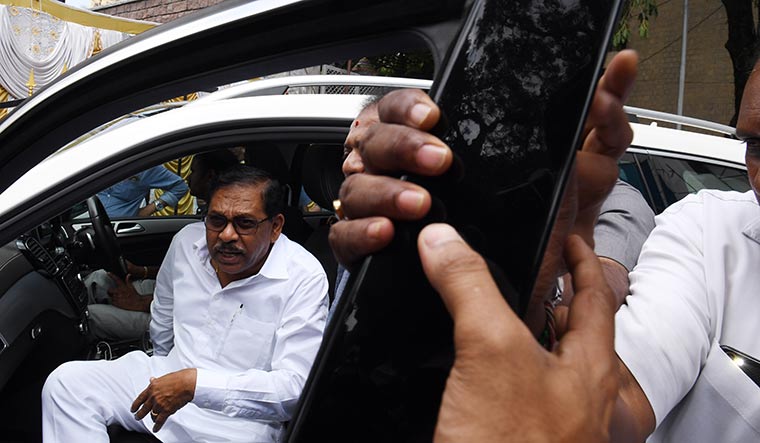AFTER THE ARREST of Congress strongman D.K. Shivakumar on money-laundering charges, the Karnataka Congress has suffered yet another setback with its former president G. Parameshwara getting embroiled in a medical admission scam. The situation turned murkier with the alleged suicide of Parameshwara’s secretary M.S. Ramesh on October 12, two days after the income tax department launched raids across properties linked to Parameshwara and former Union minister R.L. Jalappa.
On October 12, Ramesh, 40, dropped his 13-year-old son at school, savoured his favourite dish—ragi mudde—prepared by his wife on his request, and left home. A few hours later, he was found hanging from a tree in the Bangalore University (Jnanabharathi) campus. A death note recovered from his car said he was ending his life as he felt “appalled” by the raids and feared for his “reputation”.
Congress leaders called the death a case of “tax terrorism” unleashed by the Centre. But the income tax department, which raided 25 locations including Parameshwara’s Sri Siddhartha Academy of Higher Education, Tumakuru, and Sri Devaraj Urs Academy of Higher Education and Research, Kolar, run by the Jalappa family, said it had unearthed a medical admission scam worth Rs100 crore.
The alleged scam has exposed the loopholes in the National Eligibility Cum Entrance Test (NEET) admission process. While NEET rule mandates that the state quota be divided—40 per cent seats each for merit and payment quotas and 20 per cent for management quota— many private colleges are allegedly selling merit seats for a hefty sum by blocking merit seats using eligible candidates and converting them into management quota.
It is said that Ramesh was privy to Parameshwara’s business dealings and was under pressure because of the income tax raids. “Ramesh was with Parameshwara when IT officials came to Koratagere and took them to Parameshwara’s residence,” said his brother Satish. “On October 10, IT officers accompanied Ramesh to his house and left with him after about four hours. On October 12, Ramesh came home at around 5:30am and left around 9am, telling his wife that he was going to sahebru’s (Parameshwara) house. The TV soon started flashing the news that Ramesh had committed suicide. He ended his life due to IT harassment.”
The IT department, however, denied that its officers searched or interrogated Ramesh. The department said in a statement that its officers escorted Parameshwara back to his Bengaluru home from Koratagere where he had gone for a function. Ramesh had accompanied them and stayed at Parameshwara’s residence till the search got over at 2:45am on October 12. “No search was done at the residence of Ramesh and also no statement was recorded,” said the statement.
The department said it found incriminating evidence on the malicious conversion of merit seats into management quota seats. While Parameshwara’s institution allegedly blocked and converted 156 seats, Jalappa’s medical college converted 29 seats. A press note issued by the Central Board of Direct Taxes revealed that the 185 seats went for around Rs100 crore. “Incriminating evidence that substantiates conversion of seats, commission payments to brokers and sale of seats in exchange of receipt of cash have been found,” said the note.
The income tax department said it has evidence to establish the purchase of immovable assets by the trustees of the two institutions using money from the scam and to prove that the ill-gotten cash was diverted for the construction of hotels. IT sleuths said they have unearthed Rs4.22 crore of unaccounted cash, including Rs89 lakh from Parameshwara’s house. The IT department statement further said that trustees have opened bank accounts in the names of their employees to deposit some of the capitation fee received in cash and fixed deposits amounting to Rs4.6 crore in the names of eight employees have been seized. The interest was being used to service loans taken by the trustees, according to the statement. With confessions by some of the students and agents who were part of the scam, the trustees could face charges under the Prevention of Money Laundering Act, too.
Parameshwara, meanwhile, professed innocence and said he got involved in the day-to-day affairs of the medical college only after the death of his elder brother last year. “We are not at fault. This institution was started by my late father, Gangadharaiah, 50 years ago. My elder brother’s son [Dr G.S.] Anand had been handling the administration till I took over six months ago,” said Parameshwara. Anand reportedly told investigators about how the college exploited the loopholes in the NEET process and inducted students with very low ranks. The seat-blocking mafia would lure students with high NEET ranks and hold them till the counselling got over. They would drop out closer to the deadline for admission so that the seats could end up in the management quota. Those seats would then be sold for exorbitant sums.
The income tax department got interested after it came across advertisements on social media about easy medical seats. According to income tax officials, all 156 students who dropped out after taking admission at Parameshwara’s college came from a coaching centre in Kota, Rajasthan.
BJP MLC N. Ravikumar said the raids were not politically motivated. “A large number of Congress leaders own medical colleges. The seats are blocked by proxy students only to surrender them at the last minute,” he said. “Some meritorious students are lured with money to block the seats to favour low-ranking students who can afford to pay lakhs.”
A senior official from the Rajiv Gandhi University of Health Sciences said rules needed to be amended to reform the situation. The university is facing an ethical dilemma over the fate of 212 first-year MBBS students, who are suspected of being involved in a similar case last year. “The immediate remedy is to amend the rules and insist on leaving the merit quota vacant even if no meritorious students claim the seats,” said the official. “The proxy students need to be punished severely to send a stong message.”


